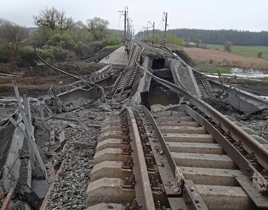FEATURE
Two trains. £10 million worth of aid. Everything needed to rebuild bomb-damaged bridges, tunnels, and other railway infrastructure. All sent from the UK to the Ukraine - the largest non-military direct assistance to the war-torn country.
“We talk about the Railway Family. This is it,” says Network Rail Chief Security Officer Peter Gibbons.
“We have done a good job. Quick. Efficient. Pat ourselves on the back.
“But we are not done yet. Ukraine’s railway is still being blown up every day. I have the Telegram app on my phone. It pings every time an air raid siren goes off in Ukraine. It’s ten or 15 times a day.”
It began when Gibbons needed to start tracking the cyber security threat to Network Rail, in the weeks leading up to war in Europe. That led him into working alongside UIC (the international union of railways) in Brussels.
“The initial efforts were all about refugees, so from our point of view, it was just handling Ukrainians arriving at UK stations,” he explains.
“We wanted to do something more substantial. We identified some end-of-life Network Rail vehicles and kit. Generators, jerry cans, track clips, PPE - kit we could drive to the border between Poland and Ukraine, and hand over the keys.”
Examples of the destruction the war has brought to railway bridges in Ukraine. The locations are being kept non-specific and there’s no suggestion that these are the ones being replaced.
But it wasn’t that simple. Network Rail is publicly owned and foreign aid is not within Network Rail’s remit. Nor is humanitaria.
Read this article in full in RAIL issue 983
To read all our magazine articles, choose from either a Digital Edition Membership from just 99p for your first month, or a Print & Digital Edition package from just £9.50 per month. Choose your Membership here















Login to comment
Comments
No comments have been made yet.